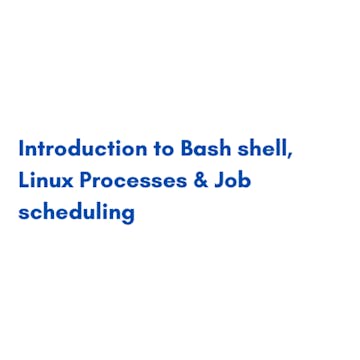
By the end of this project, you will be able to identify the shell and the bash with Linux and use the bash shell to print a value using the echo command. Moreover, you will be able to create a variable and manage environment variables in the shell, which are often needed by applications. Also you will be able to identify the process, print all processes on our system, list the first ten processes on our Linux operating system with a different display format and display the processes that are owned and executed by the current connected user only. Finally, you will be able to execute a job in the background, bring a job to the...
Read more
Good to know
Save this course
Reviews summary
Bash terminal basics
Activities
Follow a Bash Shell Tutorial
Show steps
This will help you learn the basics of the Bash shell.
Browse courses on
Bash Shell
Show steps
-
Find a reputable Bash shell tutorial online
-
Follow the tutorial step-by-step
Reviewing Unix System Programming
Show steps
This will help you understand how to use the Bash shell and many of the other Unix commands and utilities.
View
Practice of Programming, The (Addison-Wesley...
on Amazon
Show steps
-
Review the first few chapters of the book
-
Complete the exercises in the book
-
Create a simple Unix shell script
Practice Bash Shell Commands
Show steps
This will help you solidify your understanding of Bash shell commands.
Browse courses on
Bash Shell
Show steps
-
Find a list of common Bash shell commands
-
Practice using each command in a terminal window
Four other activities
Expand to see all activities and additional details
Show all seven activities
Write a Summary of Bash Shell Commands
Show steps
This will help you reinforce your understanding of Bash shell commands.
Browse courses on
Bash Shell
Show steps
-
Create a document that lists all of the Bash shell commands you have learned
-
For each command, write a brief description of what it does and how to use it
Create a Simple Bash Shell Script
Show steps
This will help you apply your Bash shell skills to a practical project.
Browse courses on
Bash Shell Scripting
Show steps
-
Come up with an idea for a simple Bash shell script
-
Write the script
-
Test the script
Attend a Bash Shell Meetup
Show steps
This will help you connect with other people who are interested in Bash shell.
Browse courses on
Bash Shell
Show steps
-
Find a Bash shell meetup in your area
-
Attend the meetup
Attend a Bash Shell Workshop
Show steps
This will help you learn more about Bash shell in a hands-on environment.
Browse courses on
Bash Shell
Show steps
-
Find a Bash shell workshop in your area
-
Attend the workshop
Follow a Bash Shell Tutorial
Show steps
This will help you learn the basics of the Bash shell.
Browse courses on
Bash Shell
Show steps
- Find a reputable Bash shell tutorial online
- Follow the tutorial step-by-step
Reviewing Unix System Programming
Show steps
This will help you understand how to use the Bash shell and many of the other Unix commands and utilities.
View
Practice of Programming, The (Addison-Wesley...
on Amazon
Show steps
- Review the first few chapters of the book
- Complete the exercises in the book
- Create a simple Unix shell script
Practice Bash Shell Commands
Show steps
This will help you solidify your understanding of Bash shell commands.
Browse courses on
Bash Shell
Show steps
- Find a list of common Bash shell commands
- Practice using each command in a terminal window
Write a Summary of Bash Shell Commands
Show steps
This will help you reinforce your understanding of Bash shell commands.
Browse courses on
Bash Shell
Show steps
- Create a document that lists all of the Bash shell commands you have learned
- For each command, write a brief description of what it does and how to use it
Create a Simple Bash Shell Script
Show steps
This will help you apply your Bash shell skills to a practical project.
Browse courses on
Bash Shell Scripting
Show steps
- Come up with an idea for a simple Bash shell script
- Write the script
- Test the script
Attend a Bash Shell Meetup
Show steps
This will help you connect with other people who are interested in Bash shell.
Browse courses on
Bash Shell
Show steps
- Find a Bash shell meetup in your area
- Attend the meetup
Attend a Bash Shell Workshop
Show steps
This will help you learn more about Bash shell in a hands-on environment.
Browse courses on
Bash Shell
Show steps
- Find a Bash shell workshop in your area
- Attend the workshop
Career center
Linux Administrator
Systems Administrator
DevOps Engineer
Cloud Architect
Backend Developer
Frontend Developer
Full-Stack Developer
Database Administrator
Network Administrator
Security Analyst
Quality Assurance Tester
Data Scientist
Software Engineer
IT Technician
Help Desk Analyst
Reading list
Share
Similar courses
OpenCourser helps millions of learners each year. People visit us to learn workspace skills, ace their exams, and nurture their curiosity.
Our extensive catalog contains over 50,000 courses and twice as many books. Browse by search, by topic, or even by career interests. We'll match you to the right resources quickly.
Find this site helpful? Tell a friend about us.
We're supported by our community of learners. When you purchase or subscribe to courses and programs or purchase books, we may earn a commission from our partners.
Your purchases help us maintain our catalog and keep our servers humming without ads.
Thank you for supporting OpenCourser.



